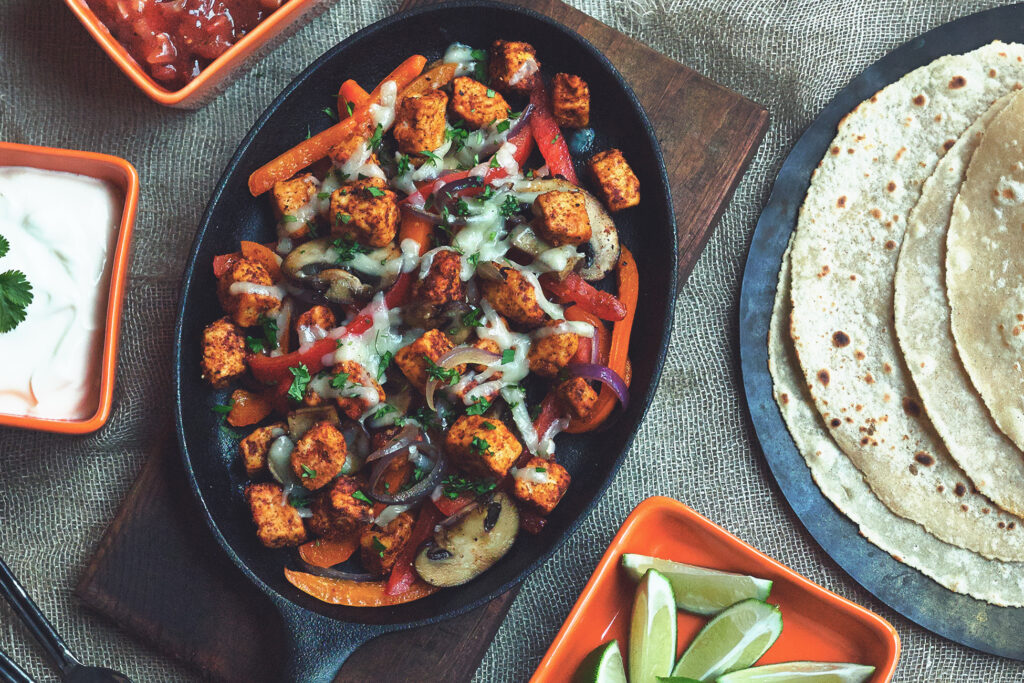5 Mins Read
Reducing portion sizes has been the most effective strategy to reduce meat intake in the UK, a new study has found.
Meat consumption fell to its lowest levels in the UK last year, driven by the cost-of-living crisis and a growing awareness about the health and environmental detriments animal proteins bring.
Experts and advocacy groups have been figuring out ways to help Brits cut back on meat even further, promoting dietary changes, meat-free days, or eating meat more occasionally. But none of these have proven to be as effective as portion control, according to a new study by the University of Edinburgh’s Global Academy of Agriculture and Food Systems.
Published in the Nature Food journal, the researchers found that meat consumption dropped by 15% from 2008-19, and 52% of this reduction was attributed to smaller meal portions. It joins previous research showcasing the potential of portion control to reduce food waste and improve public health.
In comparison, fewer meat-eating days contributed to 24% of the share and fewer daily meat-eating occasions were responsible for 7%, while the reduction in the proportion of meat-eaters lowered consumption by 17%.
“By reducing portion sizes, we see a sustainable and achievable approach to cutting down meat consumption, especially for those less inclined to adopt meat-free days,” said Prof Lindsay Jaacks, one of the study’s authors. “This strategy presents a practical path forward for both improving health outcomes and addressing environmental concerns.”
Why smaller portions help lower meat intake

The researchers used data from the UK’s National Diet and Nutrition Survey in the decade leading up to 2019. This contains recordings of all food and drinks consumed over four days, obtained from diaries participants were required to keep.
Meat consumption patterns were examined by focusing on the shifts in frequency and amount of intake, covering processed, red and white meat products. The researchers also made sure that in multi-ingredient dishes, only the meat component was included, while portion sizes and consumption frequencies were separately estimated for meals with several types of meat.
They analysed four types of consumer behaviour: the number of meat-eating days, the percentage of the population that eats meat, daily meat-eating occasions, and portion sizes – estimates for the latter were based on food labels or household measures.
They found a six-point decrease in the number of UK residents consuming meat on all four days between 2008 and 2019, with daily per capita consumption of meat decreasing by 17.5g. But 9.07g of this was attributed to reduced portion sizes.
Men and people from lower socio-economic backgrounds – who typically consume more meat – were more likely to reduce their meat intake by choosing smaller portions, while women and high-income Brits were more likely to completely cut out meat.
The study pointed to previous research finding omnivores to have the lowest appreciation of meat-free meals to suggest that encouraging this group to cut portion sizes may be most impactful. “Transitioning to low-meat meals might also present fewer barriers than adopting meat-free meals due to reduced reliance on taste preferences, perceived social norms and cooking skills,” it added.
Much of the reduction in consumption came via red and processed meats – Brits were found to be eating more white meat at the end of the study period, which the researchers ascribed to lower costs and perceived health benefits.
Red and processed meats have been classed as carcinogens by the WHO, and are linked with much greater risks of chronic conditions like type 2 diabetes, obesity, colorectal cancer, and cardiovascular disease, among others. But despite the decline, a third of the population continues to eat more red meat than recommended.
Reducing meat consumption critical for UK’s climate goals

“This research offers critical insights into how the UK’s dietary landscape is shifting and could guide future interventions aimed at encouraging healthier and more sustainable eating habits,” said study co-author Alexander Vonderschmidt.
“By understanding the factors driving these changes, such as portion size reduction and demographic influences, policymakers and health professionals can design targeted strategies that resonate with different consumer groups,” he added.
The study outlined how collaboration between policymakers and food manufacturers to establish portion size guidance could be an important step forward, as would a reformulation of composite meat dishes, and the development of blended meat products (a combination of conventional meat and plant-based ingredients).
The latter strategy has been gaining ground over the last year, with a number of brands popping up. Quorn, the UK’s largest meat-free player, has signed a deal to provide its mycoprotein or blended burgers and sausages at National Health Service hospitals across the country.
Incorporating more plant-based proteins into meat-eaters’ diets can bring significant benefits to planetary and public health. Animal proteins, especially red meat like beef, have a much heavier impact on the planet, which is why the UK’s Climate Change Committee has said meat and dairy consumption should be slashed by up to 50% by 2050 to help the country meet its net-zero goal.
The government has also been ramping up its support for alternative proteins, having invested £91M in the category – part of which went to the National Alternative Protein Innovation Centre in Leeds. It’s also reforming the regulatory framework for the approval of novel foods like cultivated meat, in a bid to help companies reach the market faster.
Meanwhile, the Labour government is being urged to create an action plan for a transition to a plant-based food system, align the national Eatwell Guide with sustainability, shake up public procurement to promote plant proteins, and level the playing field for the alternative protein sector.



